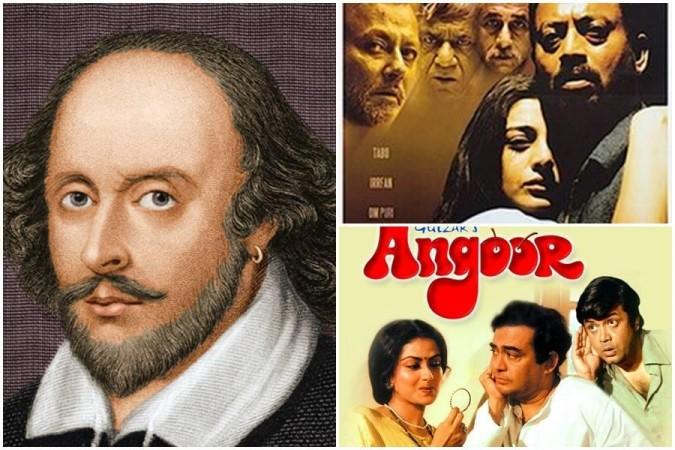The Hindi film has now acquired legitimacy as a marker in the evolution of mass culture. When you try to look for William Shakespeare in Hindi films director Vishal Bhardwaj's name floats in the search bar of the browser. But much before the rise of Bhardwaj, Shakespeare had been the yeast that was used in the dough named Hindi cinema, to make it rise with legitimacy and concrete script.
The rise of Indian cinema geographically took place on the floorboards of the Parsi theatres, but it was Shakespeare's strong source of influence that inspired the writings, dialogues and characters of the films.

In Amitabh Bachchan's Agneepath, the star plays a mafia done. He had a mother who strongly disapproved of his lifestyle. When he washed his hands before preparing a meal to appease his parent, the mother remarked that all the water of Bombay will not be enough to clean the blood in your hands.
The concept of washing your hands to get rid of the blood was explored in Macbeth, which had been written in the 14th century. After participating in the regicide, Lady Macbeth kept washing her hands hoping to get rid of the bloodstains. Commercial films have borrowed lines from plays of Shakespeare, which have often gone noticed yet uncredited. .
The attempt to decode Shakespeare in the Indian context had been initiated earlier in Gulzar's Angoor. It had been the Indianisation of The Comedy of Errors and quite a commercially successful one. That was also an era, when films which were claimed to be a Shakespearean adaptation, failed to do well at the box office. Angoor never acknowledged the contributions of Shakespeare until the very end when it flashed a portrait of the playwright winking at the audience.
It wouldn't be completely wrong to say that plays such as Midsummer Night's Dream, The Comedy of Errors which had been written in the fourteenth century, published in the First Folio, had been scripts that were tailor-made for Indian audiences who enjoyed a fun-filled drama. Shakespeare, is not always about tragic love, but who would have believed that without one winking motion of the playwright?
The arrival of Vishal Bhardwaj
In the early 20s Vishal Bhardwaj appeared in the Hindi film industry and changed the frames of Shakespearean dramas. Maqbool (2004), to date, remains an outstanding example of this practice to reinvent Shakespeare in the Indian context.
Late actor Irrfan, who once appeared on All India Bakchod's comedy video had (jokingly) said about the script in Maqbool that Shakespeare had appeared in his dreams and said that, 'Oh Irrfan you have indeed done a fabulous job'.
In various Shakesperean plays, dead people arrive back in the form of spirits to send an important message about the future.
War-torn Scotland from Macbeth was reimagined in the ganglands of Mumbai where an aged don Jehangir Khan and his right hand Maqbool control the town. Three policemen play the role of the witches who predict the future for Maqbool. Lady Macbeth is re-interpreted as Duncan's mistress. While playing the role of the personal prostitute of Khan, she desires the company of Maqbool as she is sexually unsatisfied with Khan's relationship.
Originally, in the Shakespearean play, Macbeth and Lady Macbeth invited Duncan to their residence for a feast and killed their guest. In Bhardwaj's film, Maqbool and Nimmi (Lady Macbeth) invite Khan to a wedding and plan a murder on auspicious occasion.
Bhardwaj had further explored and reused the Shakespearean play Hamlet in Haider, in the backdrop of Kashmir, post the genocide of Kashmiri Pandits. He focuses on the present context of a middle-class family stuck in a war-torn state that has to question 'to be' or 'not to be' with India. Magnificently, it is the creation of Roohdar played by late actor Irrfan Khan who brought magic to the screen.
In the original play of Hamlet, the spirit of King Hamlet had made an appearance and had asked Hamlet to take revenge on Claudius for plotting his murder. Bhardwaj makes Rooh appear in white. He takes on the role of a 'soul friend' of the doctor who managed to escape from hell, in Haider's case, the hell were the camps where young terrorists were imprisoned and interrogated.




!['Lip lock, pressure, pyaar': Vidya Balan- Pratik Gandhi shine in non-judgmental infidelity romcom Do Aur Do Pyaar [ Review] 'Lip lock, pressure, pyaar': Vidya Balan- Pratik Gandhi shine in non-judgmental infidelity romcom Do Aur Do Pyaar [ Review]](https://data1.ibtimes.co.in/en/full/797104/lip-lock-pressure-pyaar-vidya-balan-pratik-gandhi-shine-non-judgmental-infidelity-romcom.jpg?w=220&h=135&l=50&t=40)










